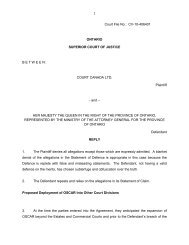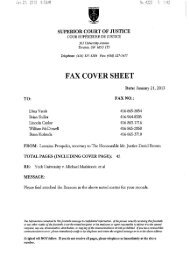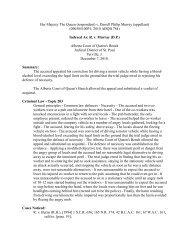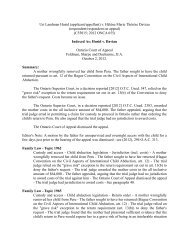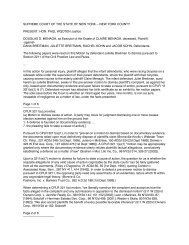Rogers Communications Inc., Rogers Wireless Partnership ... - Slaw
Rogers Communications Inc., Rogers Wireless Partnership ... - Slaw
Rogers Communications Inc., Rogers Wireless Partnership ... - Slaw
Create successful ePaper yourself
Turn your PDF publications into a flip-book with our unique Google optimized e-Paper software.
numerous different recipients", which made this case distinguishable from CCHCanadian Ltd. et al. v. Law Society of Upper Canada (2004 SCC) - See paragraphs 1 to57.Copyright - Topic 3444Fees, charges or royalties - Internet (world wide web) - Music - The Society ofComposers, Authors and Music Publishers of Canada applied for a tariff with respect tothe performance and communication of musical works on, or by means of, the Internet -The Copyright Board found that the transmission of a musical work to an individual byan online music service (streams) constituted was a communication of that work to thepublic by telecommunication (Copyright Act, 3(1)(f)) and thus were the proper subjectfor a tariff - Online music services, after an unsuccessful judicial review application,appealed - The Supreme Court of Canada dismissed the appeal, holding that thetransmission of any file containing a musical work, starting with the first, from the onlineservice's website to the customer's computer, at the customer's request, constituted"communicat[ing] the work to the public by telecommunication" within the meaning of s.3(1)(f) - See paragraphs 1 to 57.Copyright - Topic 5667Copyright Board - Jurisdiction - Judicial review - The Copyright Board (the FederalCourt of Appeal agreeing), opined that streams of musical works over the Internet camewithin the exclusive right of copyright holders to communicate "to the public" bytelecommunication (Copyright Act (s. 3(1)(f)) - Accordingly Tariffs could be established- Music service providers appealed - The Supreme Court of Canada discussed thestandard of review given that the court and the Copyright Board had concurrentjurisdiction at first instance in interpreting the Copyright Act - That concurrentjurisdiction rebutted the presumption of reasonablness review of the Board's decisions onquestions of law under its home statute - Therefore, the standard of correctness was theappropriate standard of review on questions of law arising on judicial review from theCopyright Board, such as the interpretation issue in this case - However, the Board'sapplication of the correct legal principles to the facts of a particular matter should betreated with deference - See paragraphs 10 to 20.Courts - Topic 103Stare decisis - Authority of judicial decisions - English, American and Foreign authorities- American decisions - Section 3(1)(f) of the Copyright Act provided that copyrightholders had the sole right, "to communicate the work to the public bytelecommunication" - It was argued, based on American jurisprudence and in particular,Carton Network v. CSC Holdings <strong>Inc</strong>., that the potential audience of "each point-to-pointtransmission" had to be considered to determine whether a given transmission was "to thepublic" - The Supreme Court held that this case was of no assistance in interpreting thephrase "communicate a work to the public" because of the difference in wording betweenthe American and Canadian legislation - The court stated that "This Court has recognizedin the past important differences both in wording and in policy between Canadian andAmerican copyright legislation. It has warned that 'United States court decisions, evenwhere the factual situations are similar, must be scrutinized very carefully' ..." - See


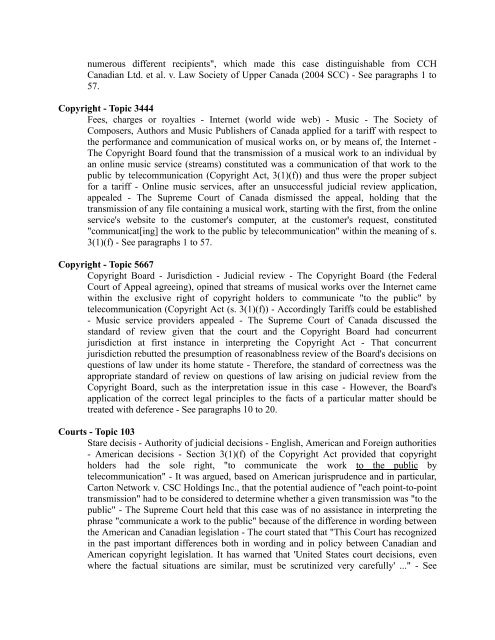
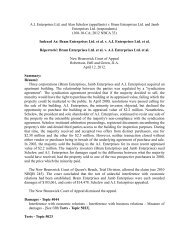
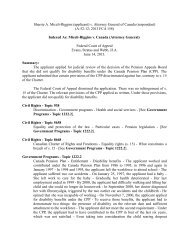
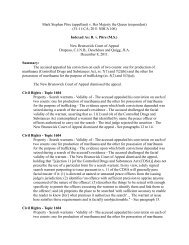
![Jones (appellant) v. Kaney (respondent) ([2011] UKSC 13 ... - Slaw](https://img.yumpu.com/46577625/1/190x245/jones-appellant-v-kaney-respondent-2011-uksc-13-slaw.jpg?quality=85)
